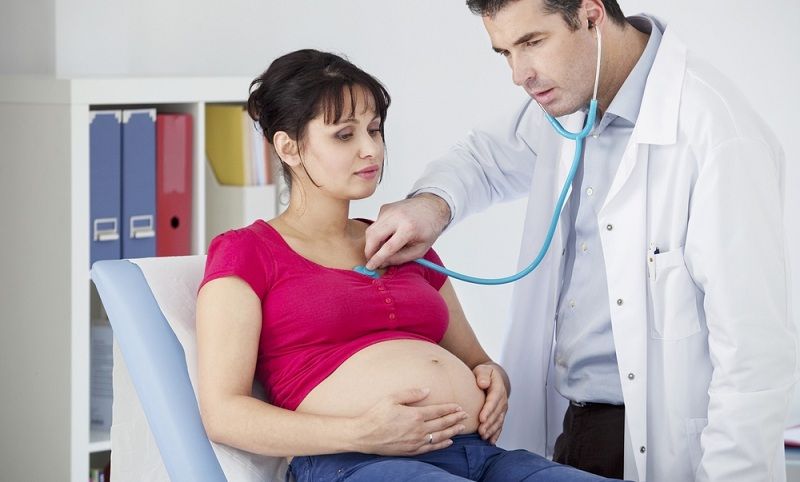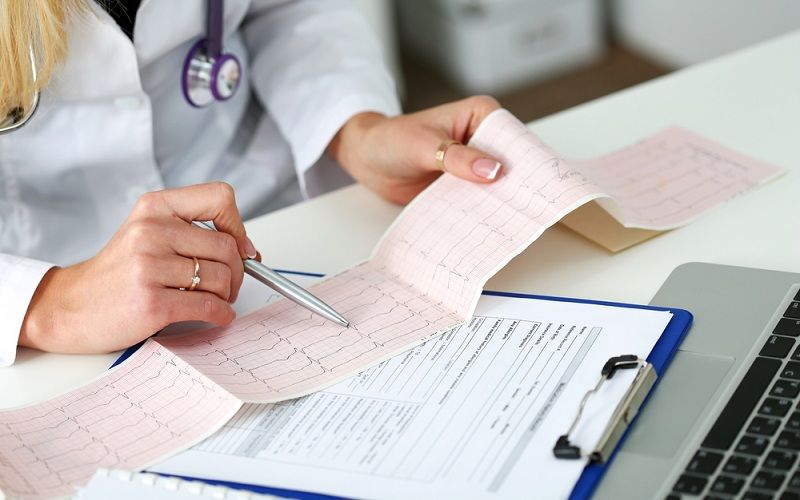
Arrhythmia During Pregnancy
Pregnancy, even easy flowing, is a serious stress for the organism of the future mother. Constant stress, raging hormones, the need to “work for two” – all this somehow affects the state of the organs. It is not surprising that in 9 months such symptoms and diseases appear, which the expectant mother had never thought about before. Of course, the greatest stress falls on the reproductive and hormonal systems, but the cardiovascular sometimes suffer no less. One of the common pathologies is arrhythmia – a heart rhythm disorder that can occur both before pregnancy and after it occurs. What are the features of the arrhythmia during pregnancy, how does it threaten the mother and baby and, most importantly, what to do to cope with the dangerous symptoms? Let’s try to understand these issues.
What is the pathology of the heart rhythm?
Arrhythmia can be both an independent disease and a symptom of other, more serious problems in the work of the cardiovascular system. The disease is a recurring attack of heart rhythm disturbances for no apparent reason. This means that from time to time the heart may beat faster or, on the contrary, slow down its work, and changes in the pulse occur spontaneously. As a result, all the internal organs of a woman receive fewer oxygen molecules, which normally should be carried by the circulatory system throughout the body. Regularly repeated arrhythmia causes oxygen starvation of the fetus, which, in turn, adversely affects the overall development and the timely formation of the crumbs.
Most often, during pregnancy, an arrhythmia appears in women prone to this pathology before conception, but even those patients who have never complained of cardiac problems are not immune from attacks – the disease is rather unpredictable and, moreover, insidious. That is why expectant mothers need to carefully monitor their health, listen to any unpleasant symptoms and consult a doctor in a timely manner in order to prevent aggravation of the situation.
Disease classification
Features of the course of arrhythmia, and hence the subsequent treatment depends primarily on the form of the disease. Failures in heart rhythm can manifest itself as follows:
- Extrasystoles are the most benign form of cardio pathology, which in most cases does not cause problems, and sometimes does not manifest at all, with the exception of periodic atrial flutter in the chest.
- Atrial fibrillation – much more dangerous, especially for the fetus. It is this form of deviation that can cause hypoxia; provoke a spontaneous abortion or premature birth. If you do not take action in time, the seizures will become longer and deeper each time.
- Sinus arrhythmia is by far the most dangerous form of the disorder. Most often, it is not an independent disease, but a symptom of much more serious cardiological problems. Unpredictable symptoms of the onset of an attack, which are characterized by loss of consciousness, feeling of suffocation, darkening of the eyes, etc., are a particular risk for the pregnant woman.
Causes of arrhythmia during pregnancy
Normally, the heart rate is controlled by the sinus node of the right atrium: an electrical pulse that penetrates from the atrium into the ventricles provokes muscle contraction, thereby triggering the heart to work. Failure leading to arrhythmias can occur at any of the stages of this mechanism — directly in the sinus node, on the way from the atrium to the ventricles or in the myocytes of the heart. Let’s take a closer look at each of the possible scenarios:
1. Disruption of automatism
If there is a violation in the sinus node, several variants of the clinical picture may arise:
- heterotrophic disorder in which the sinus node does not cope with the assigned function, and heart rate generation occurs in other areas;
- tachycardia, which is characterized by a high pulse with a normal sinus rhythm;
- actually arrhythmia, that is, a heart rhythm disorder;
- bradycardia with a slow pulse up to 60 beats per minute or less.
Externally, this pathology is felt by the patient at the physiological level: it begins to throb in the temples (with tachycardia) or, on the contrary, weakness, dizziness, fainting (with bradycardia) occurs.
2. Violation of conductivity
If the electric pulse is not fully transmitted from the sinus node to the atria and subsequently to the ventricles, the cardiologist diagnoses a violation of cardiac conduction, which manifests itself by various symptoms, including arrhythmia.
3. Violation of excitability
This factor is characteristic mainly for extrasystoles. In this case, there are abnormalities in myocytes that do not react to the correctly transmitted impulse. However, with a particularly serious pathology, tachycardia is also possible up to 160 beats per minute, which after a certain period of time is usually stopped by itself.
What contributes to the occurrence of the disease? Most common risk factors
Factors affecting the development of arrhythmia during pregnancy are:
- Changes in the circulatory system, characteristic of the period of pregnancy. In women, “in position” dramatically and significantly increases the total blood volume: firstly, it allows for full circulation in the mother-placenta-fetus system, and secondly, it prevents serious consequences of inevitable blood loss during labor. However, such a load affects the work of the heart, causing failures, including arrhythmia.
- Emotional imbalance. Any stress or psycho-emotional stress during pregnancy is felt quite differently, and excessive emotionality or excitement inevitably leads to an increase in pulse rate. Therefore, in such a sensitive period, it is better to avoid any shocks.
- Long toxicosis. Exhausting nausea and other symptoms of toxicosis exhaust the body, forcing them to work in “emergency” conditions. Such loads, coupled with a lack of nutrients, which is inevitable with constant nausea and vomiting, can lead to heart rhythm pathology.
- Anemia. During pregnancy, the level of hemoglobin decreases, which can cause the oxygen starvation of the mother and child. Protective mechanisms, trying to compensate for the deficiency, activate blood circulation by increasing heart rate, which causes frequent attacks of arrhythmia.
- The lack of trace elements. Eating a pregnant woman should be especially carefully thought out and balanced because the incoming nutrients should be enough not only for the woman but also for the fetus. Iodine, potassium, iron deficiency affects the patient’s well-being, and attacks of arrhythmia are one of the common symptoms of this condition.
- Causes not related to pregnancy. Unfavorable heredity, chronic medical history, thyroid abnormalities, vegetative-vascular dystonia and dozens of other abnormalities may become concomitant risk factors for the development of arrhythmia during gestation of the baby.
Symptoms of the disease
During an arrhythmia attack, the following symptoms occur:
- a sharp change in heart rate – slowing down or, conversely, acceleration;
- dizziness up to loss of consciousness;
- weakness, blurred vision, knocking in temples;
- hyperemia of the skin (usually on the face, cheeks);
- tremor in the fingers;
- “Fluttering” in the heart;
- nausea, vomiting.
In most cases, malfunctions of the heart are felt physically, but weak attacks can be easily confused with ordinary exhaustion or toxicosis, so if you have the slightest suspicion, you should be examined by a cardiologist just in case – he will accurately determine the presence of the arrhythmia.
Diagnostic manipulations
In order to identify the arrhythmia during pregnancy, the clinical picture and subjective sensations of the patient are far from always enough – in some cases, specialized diagnosis is required to make a diagnosis. The simplest and most obvious way is to measure heart rate: if normally the pulse varies in the range of 60-80 beats per minute, then during an attack of arrhythmia, these indicators can significantly decrease or, conversely, increase. However, not every case of bradycardia can be considered as an arrhythmia – a similar pathology occurs only with a simultaneous change in the frequency and rhythm of the pulse.
To clarify the features of the course of arrhythmia during pregnancy, a cardiologist may recommend the following studies:
- standard electrocardiography
- daily monitoring of ECG dynamics,
- Ultrasound of the heart and thyroid gland,
- general and biochemical blood tests,
- Study of thyroid hormone levels.
Such a thorough diagnosis makes it possible to determine not only the presence of arrhythmia, but also the particularities of its course, the specific form, and severity, and therefore, a correct program of therapy is drawn up, which is especially important during pregnancy when the list of approved drugs is extremely small.
Treatment of arrhythmia during pregnancy
Each case of abnormal heart rhythm in a pregnant woman is considered individually because the main thing is that the benefits of the prescribed therapy be combined with the absence of risks to the development of the fetus. Mild forms of pathology try to arrest the lifestyle change since this method is as safe and effective as possible. Useful recommendations, which are prescribed by a specialist in case of arrhythmia, not only do not harm, but also help to improve the general well-being of women, facilitate the course of pregnancy and support the body in such a difficult period:
- Moderate intake of salt (no more than 5 g daily), sugar and animal lipids that are difficult to digest.
- A diet rich in potassium, calcium, and magnesium: dairy products, buckwheat, nuts, pumpkin seeds, dried fruits, black currants, cabbage, honey, etc.
- Frequent, but fractional meals in small portions 5 times a day.
Such therapy is applicable only for infrequent and easily occurring attacks of arrhythmia and requires careful medical supervision. In the absence of positive dynamics, a more serious medical support of the organism is required, the features of which depend on the form of the disease and the duration of pregnancy. After studying the history and clinical picture, a cardiologist may prescribe sympathomimetics, cardiac glycosides, and other medications that are permitted during the child’s pregnancy. The exact dosage and regularity of taking the pills are also calculated by the doctor.
In the most serious cases, the treatment of arrhythmia may include surgery. The most favorable period for such manipulations is a period of 26-30 weeks, however, when life-threatening, the operation can be performed in any trimester.















